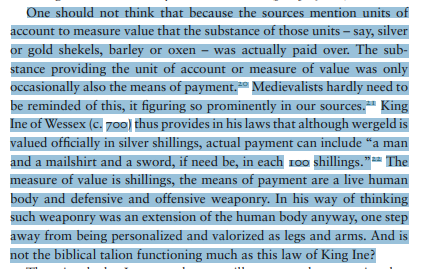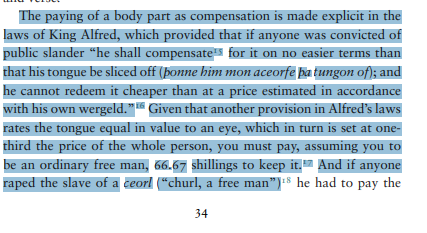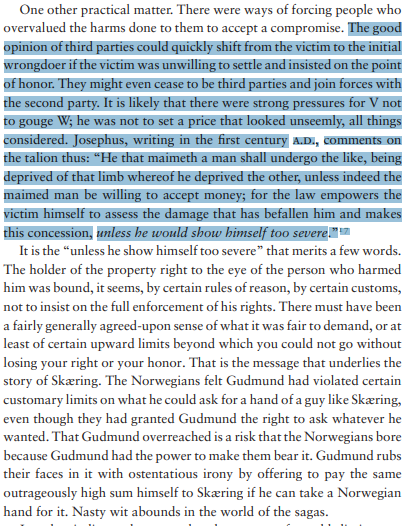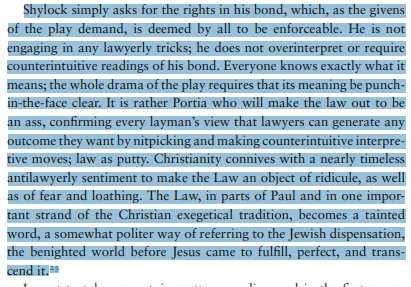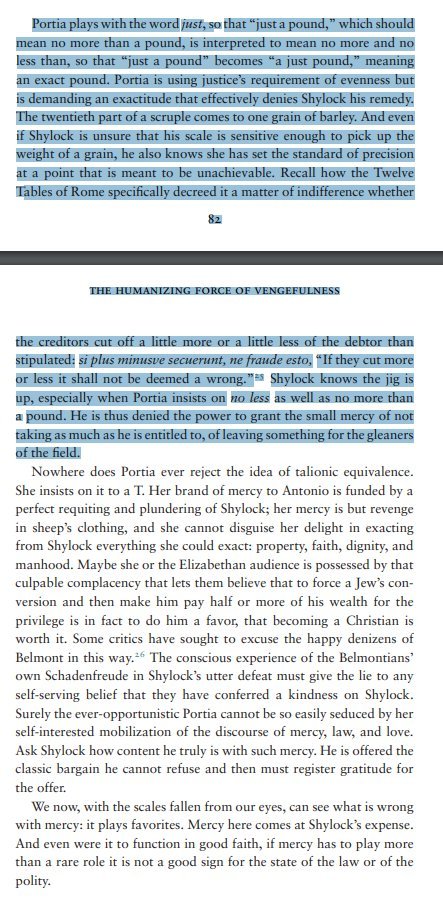So, not surprisingly, @ContraPoints newest video is schematically antisemitic, calling back to the caricature of Jewish law as "old testament brutal" and Jesus as the merciful abrogation of that law. She even gives a lazy reading of Job. https://twitter.com/ContraPoints/status/1301974353752489985">https://twitter.com/ContraPoi...
I could break this down in a lot more detail, but I think the part that& #39;s going to be more useful is to point out that @ContraPoints doesn& #39;t really have a great understanding of talionic punishment, or its intrinsically restorative component. It isn& #39;t just about revenge.
Talionic punishment arises from a desire to make an injured party whole. It exists, in part, to deal with an immensely tricky legal problem: how does one restore something that cannot be restored? How does one give value to an eye or a hand or a life?
Enter talionic punishment: an eye to me is worth the same as an eye to you. There are, of course, problems with it. But it solves some issues with an eye being worth a fixed fee. If an eye is worth $500, then a rich man can take as many eyes as he wants and just pay.
Here the talion serves as a backstop. The eye is not worth a fixed fee, or a percentage of the earnings of the person who lost it. It is worth the price of the eye of someone who took it. That scales differently. Jeff Bezos can& #39;t go around plucking out eyes.
The price then, conceptually, becomes "Jeff Bezos, how much is keeping your eye worth to you?" At the center of the talion is a symbolic exchange, a transformation that goes down a root of money as a token representing ritual sacrifice.
William Ian Miller provides a really good concrete example of how fee schedules introduced problems during the industrial revolution. Losses and death in England were compensated based on wage. Children earned almost nothing. It became very cheap for children to die during work.
The conceptual crux that @ContraPoints fails to account for is that often the desired result of talionic law was not the physical harm of the offending party. It was generally an issue of "how much" in terms of monetary and other compensation.
If @ContraPoints knew anything about Jewish law, she might understand the history of rabbinic interpretation of the talion and that their assertion that payment was not inferior to blood was something that was always part of the talionic concept.
The Israelites (and the vikings, and the Babylonians) were not backwards people who did not understand the concept of exchange. Instead they lived in a world where value had not been flattened by the market and coinage was rare.
William Ian Miller notes that payment of fees and fines set in coinage was rarely done. People didn& #39;t run around with bags of coins. Instead it was a basis for exchange. The same transformation took place with blood as with money.
It turns out, as per this example, transformation was par for the course. Speak ill of the king and lose your tongue? You could also, by statute, decide to pay with an eye or 66.67 shillings. Substitution was often legally encoded.
It was also something that was not entirely subjective. The importance of the odd-man, the law, the disinterested judge, something that Wynn herself mentions, is central here. As is communal consensus and standing in an honor society. It was a pressure keeping valuation down.
If someone wants too much money for an eye or a hand, then a court of disinterested observer, in most every system, would take on the role of valuation. Compensation had to be done according to social norms. This was a complex calculus that was quite sensitive.
In some ways the talion is significantly more sensitive / less cruel than criminal law, which offers no means of exchange, which cares not for making parties whole by compensation. Pace @ContraPoints, the talion and retribution are not of the same cloth.
This reasoning is partly why Shylock is the villain of The Merchant of Venice. He is not engaging with the market in good faith. He refuses just compensation. He& #39;s taking out his hatred on Antonio. In this case, the system breaks down.
This whole section of the play is, at least in part, a careful examination of Christian theology, of Pauline doctrine, of the law and the circumcised heart. And how miraculous iti s how Portia makes a mockery of the law!
In this thread, I& #39;m not suggesting we go back to a justice system based on talionic punishment. I don& #39;t think that& #39;s a good basis for restorative or transformative justice. But @ContraPoints account of the talion and of revenge is both wrong and unfair.
@ContraPoints fails to account for the complex logic of the talion, of it& #39;s ultimately restorative goal. We have a lot we can learn from its ends and its sensitivity. There are lots of ways it is better than what we have now. Even if its not what we ultimately want going forward
Instead @ContraPoints engages in some messy Christian equivalency of emotional or affective response and morality. Instead she describes Judaism and Buddhism and Hinduism as primitive. Of the Torah as the motivation of evil, scheming, hateful shylocks...
not mature enough to have "proper" Christian poise.
I don& #39;t think any of that intentional. I just think that
@ContraPoints is being lazy and not doing the intellectual work. I think that has political ethical problems. So fuck #contrapoints and fuck her take on #justice and fuck her schematic #antisemitism.
@ContraPoints is being lazy and not doing the intellectual work. I think that has political ethical problems. So fuck #contrapoints and fuck her take on #justice and fuck her schematic #antisemitism.
Natalie, your viewers, and the rest of us, deserve better.
As an aside, the quotations in this thread and a lot of information undergirding its arguments has been pulled from the wonderful and accessible "An Eye for an Eye" by William Ian Miller. I highly recommend it. https://www.cambridge.org/core/books/eye-for-an-eye/36BD34F54D8482FA4E5A1EB20B1539B2">https://www.cambridge.org/core/book...

 Read on Twitter
Read on Twitter